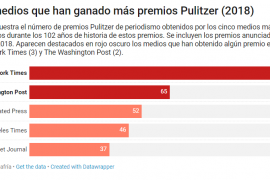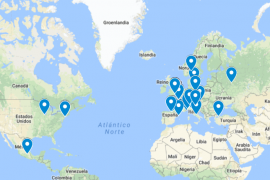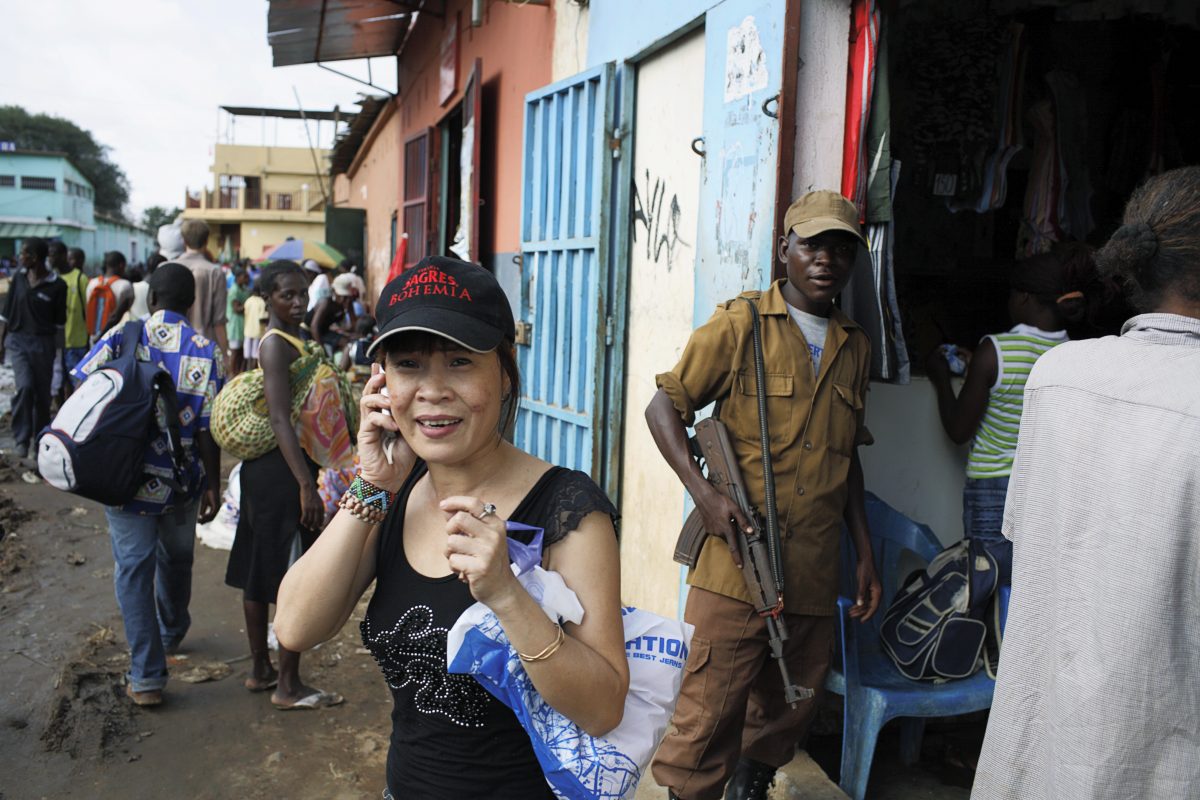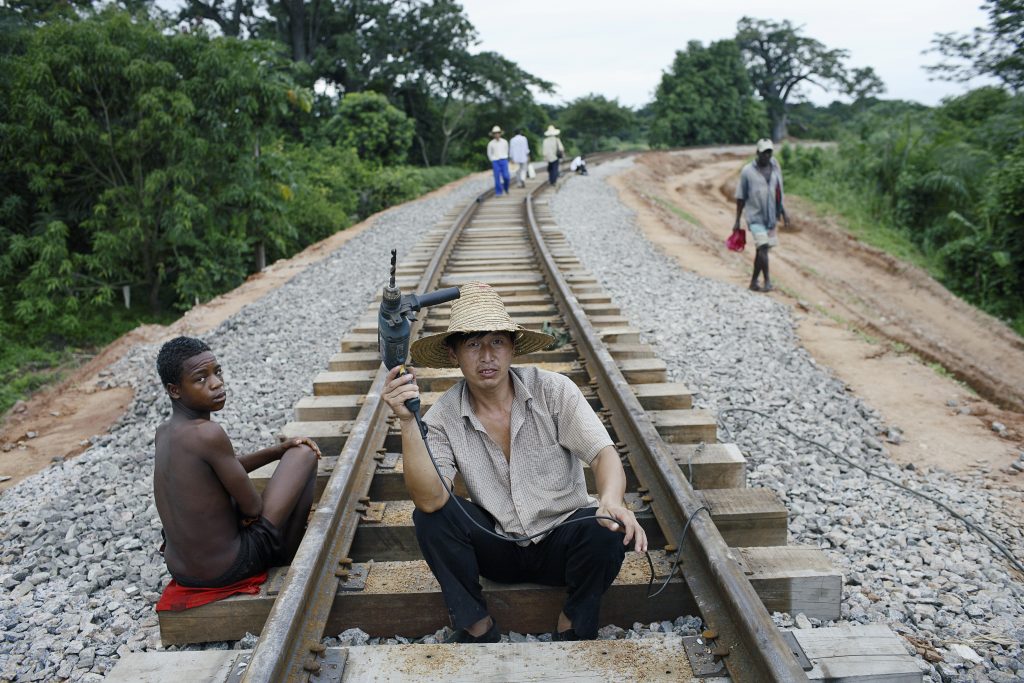Álvaro Pascual-Leone, neurologist: "We know that the brain is intrinsically...

In a few years on the market, Tesla has established...

The publishing industry views Sant Jordi as a felicitous bubble...

Barcelona has been an outstanding entrepreneurial centre for the technology...

There are things that only happen once in a lifetime....

The patient will wear a bracelet with a tag connected...

A tree in the city is much more than ornamentation...

The new Movistar Car service provides a Wi-Fi network in...

The New York Times, with a total of 125 awards,...

Three Catalan restaurants – El Celler de Can Roca (2),...

Música clásica sobre la arena de la playa en dos...

The first session of the cycle on the regatta organized...

The hospital's managing director, Manel del Castillo, and the pharmaceutical...

Generalitat y Ayuntamiento impulsarán dos equipamientos de 'Casa de les...

Leticia Beleta, director of Alexion Pharmaceuticals in Spain and Portugal,...

We all have a friend who never leaves the Gràcia...

Barcelona director opts for Best International Film with 'La sociedad...

The hotel and industrial sectors softened the market's decline last...

The technology company, with a workforce of 35 employees and...

“The women of yesteryear were strong and had to fight...

[dropcap letter=”L”]
ouis Fenaux feels passionately about the sea. Belgian of Flemish origin, Fenaux left one decade ago the Old Continent and settled in Hentiesbaai, a village in the heart of the Skeleton Coast, the mecca of fishing in Namibia. From there, he runs a small hostel and leaves early each morning with his fishing rod, to try and catch sharks or steenbras from the beach. When it is still dark, and the day is clear, he makes out the lights of Spanish, American or Chinese fishing boats fishing in the cold international waters on the coast. Fenaux is concerned about Chinese fishing boats, and while his wife Anneke cooks a delicious red fish with carrot sauce, she loosens her tongue. “The Chinese, uh? They are already everywhere in the country”, she says. On the frontier with Angola to the north, it is common to see Chinese businesses in any small village, and at the airport of Windhoek, the presence of slit-eyed executives is a common feature. Fenaux does not like it much. “Some friends from the north are concerned because a Chinese company intends to build a mine to extract uranium out of town. If they do, they will bring along their Chinese employees, supermarkets, Chinese products and restaurants, and soon all the city will disappear and Namibians will lose their jobs”, he says.
But Fenaux’s fears and his colleagues’ are unfounded. Although most of the 2,500 Chinese companies operating in Africa bring along their own Chinese workers and only employ locals for the toughest tasks, they do not absorb nor change the appearance of the villages and towns. The impact is not local but continental. Almost 3,000 kilometers of roads and 2,000 railways, apart from bridges, dams, oil pipelines and ports, China is changing the face of the whole African continent. Chinese-African commercial relations have just completed their most successful decade in history. While in the year 2000 the economic exchanges between both countries fell short of 10,000 million dollars, last year they went beyond 215,000 million. The rise is unstoppable and is already leaving behind some competitors: since 2009, China has been the first business associate in the continent, before the US.
Coffee time, and Fenaux points to one of the main factors that account for this amazing lift-off. “At the beginning, Chinese products or roads were poor in quality; but this is not the case anymore; these guys know how to do things well whenever they want to, they certainly do…” Understanding the presence of China in the black continent requires a two-way comprehension. This is not about China within Africa. This is about China and Africa. Even though, undeniably, the African natural resources provide the raw material for the Asian giant to function —approximately 80% of its imports from Africa are petrol and minerals—, China was the first to realize that the continent is not only a large extension of fertile land and rich soil but also a market opportunity.
According the economist and expert in development issues Vijay Mahajan, the lack of prejudice from an African society, not as impoverished and stationary as one may imagine, which has conferred an advantage on the Asian giant. “China has realized —says Mahajan— that Africa has a consumerist society of about 400 million people in need of products and services. Cheap ones, of course, but the market is huge”. The Bank of African Development (BDA) reports that 350 millions African people have a purchasing power of 2-20 dollars daily. Although 60% of this incipient African medium-class society only spends between 2 and 4 dollars daily, China has embraced this humble market margin that spends some more than on survival food: their main imports consist in vehicles, clothing, machinery, shoes, and plastic materials. From Angola to Senegal, through Mozambique or south Sudan, the “Made in China” fake football t-shirts and shoes or Chinese letter on vans, motorcycles or four by fours are a common sight nowadays.
The best news for China is that this is a market that will grow the most in the world. The demographic revolution in Africa has just begun: while the continent has over one thousand million inhabitants, the UN estimates that this figure will double by the year 2050. The population boom will continue, relentlessly: at the end of this century, there will be 3,500 million Africans, i.e. more than the current population of both China and India together.
These numbers could hold the key to Beijing’s master move. Paired with the population boom, there is the factor of youth —almost half of Africa is younger than 15—, which anticipates a future of hundreds of millions of youngsters ready for the labour market. For British economist and Oxford’s professor Paul Collier, China could keep its eyes on economic expansion. “Should great business opportunities in Africa meet higher and higher productions costs in China, I believe that, within ten years, China will relocate some of its businesses in Africa in an attempt to reduce costs. Should this happen, the change will be spectacular”, he states.
But there is no need to visit the future. The skyline of Luanda, capital city of Angola, with needles from dozens of cranes indicates that Chinese-African businesses are looking bright. Angola is the epitomy of the tone in commercial relations: China imports more petrol from Angola, its first African associate, that from any other country in the world and, in return, China refuses to interfere with domestic political issues, sails through a sea of unclear contracts and Chinese workforce that is changing the country’s façade thanks to skyscrapers and tarmac. Another important Chinese associate, south Sudan, a country the size of France of only 90 kilometers of paved road and bursting with petrol, may be the best example of the continent’s need of infrastructures.
South African president Jacob Zuma provided figures last year on business opportunities in Africa and offered himself to act as the gateway to the continent, as Singapore did in the 1970s and 1980s in Asia. He said it at the BRIC Summit, a group made up of the main emerging economies, Brazil, Russia, India, China, and South Africa. “In the coming ten years, Africa will need 480 thousand million dollars to develop infrastructures, and that should be of interest of the BRIC”. The capitals, Brasilia, Moscow, New Delhi and Beijing made good note of it. China amounts to 65% of the total imports in Africa of the BRIC, and will continue leading the group. There is no improvisation in the presence of China in Africa. The creation of twenty-one special economic zones (SEZ) in African countries is a firm investment aiming to tighten relations and contribute to the continent’s industrialization. In the SEZ, with world-class infrastructures, offer administrative facilities and fiscal incentives for Chinese businesses to market their products and become competitive in Africa.
It remains to be seen what the result of the latest collateral effect of the era of the African dragon: the human factor. The decade of the highest commercial expansion between China and Africa has caused over one million Chinese people to settle on African soil. Most of them go back to China when their contracts come to an end, but thousands of them have opted to stay and invest their savings on a new life in Africa. As some of them will succeed, it is probable that a pull effect of sorts may occur. If this happens, we will be witnessing the first generation of Chinese people born in Africa. A few weeks ago, on the death of president of Zambia, Michael Sata, its vicepresident occasionally took the reins of the country. He is someone born in Livingstone, but from a Scottish father, and became the first white president in the African country since its independence, with the permission of Madagascar. Maybe in the near future we will see an African president of Chinese descent.


[dropcap letter=”L”]
ouis Fenaux feels passionately about the sea. Belgian of Flemish origin, Fenaux left one decade ago the Old Continent and settled in Hentiesbaai, a village in the heart of the Skeleton Coast, the mecca of fishing in Namibia. From there, he runs a small hostel and leaves early each morning with his fishing rod, to try and catch sharks or steenbras from the beach. When it is still dark, and the day is clear, he makes out the lights of Spanish, American or Chinese fishing boats fishing in the cold international waters on the coast. Fenaux is concerned about Chinese fishing boats, and while his wife Anneke cooks a delicious red fish with carrot sauce, she loosens her tongue. “The Chinese, uh? They are already everywhere in the country”, she says. On the frontier with Angola to the north, it is common to see Chinese businesses in any small village, and at the airport of Windhoek, the presence of slit-eyed executives is a common feature. Fenaux does not like it much. “Some friends from the north are concerned because a Chinese company intends to build a mine to extract uranium out of town. If they do, they will bring along their Chinese employees, supermarkets, Chinese products and restaurants, and soon all the city will disappear and Namibians will lose their jobs”, he says.
But Fenaux’s fears and his colleagues’ are unfounded. Although most of the 2,500 Chinese companies operating in Africa bring along their own Chinese workers and only employ locals for the toughest tasks, they do not absorb nor change the appearance of the villages and towns. The impact is not local but continental. Almost 3,000 kilometers of roads and 2,000 railways, apart from bridges, dams, oil pipelines and ports, China is changing the face of the whole African continent. Chinese-African commercial relations have just completed their most successful decade in history. While in the year 2000 the economic exchanges between both countries fell short of 10,000 million dollars, last year they went beyond 215,000 million. The rise is unstoppable and is already leaving behind some competitors: since 2009, China has been the first business associate in the continent, before the US.
Coffee time, and Fenaux points to one of the main factors that account for this amazing lift-off. “At the beginning, Chinese products or roads were poor in quality; but this is not the case anymore; these guys know how to do things well whenever they want to, they certainly do…” Understanding the presence of China in the black continent requires a two-way comprehension. This is not about China within Africa. This is about China and Africa. Even though, undeniably, the African natural resources provide the raw material for the Asian giant to function —approximately 80% of its imports from Africa are petrol and minerals—, China was the first to realize that the continent is not only a large extension of fertile land and rich soil but also a market opportunity.
According the economist and expert in development issues Vijay Mahajan, the lack of prejudice from an African society, not as impoverished and stationary as one may imagine, which has conferred an advantage on the Asian giant. “China has realized —says Mahajan— that Africa has a consumerist society of about 400 million people in need of products and services. Cheap ones, of course, but the market is huge”. The Bank of African Development (BDA) reports that 350 millions African people have a purchasing power of 2-20 dollars daily. Although 60% of this incipient African medium-class society only spends between 2 and 4 dollars daily, China has embraced this humble market margin that spends some more than on survival food: their main imports consist in vehicles, clothing, machinery, shoes, and plastic materials. From Angola to Senegal, through Mozambique or south Sudan, the “Made in China” fake football t-shirts and shoes or Chinese letter on vans, motorcycles or four by fours are a common sight nowadays.
The best news for China is that this is a market that will grow the most in the world. The demographic revolution in Africa has just begun: while the continent has over one thousand million inhabitants, the UN estimates that this figure will double by the year 2050. The population boom will continue, relentlessly: at the end of this century, there will be 3,500 million Africans, i.e. more than the current population of both China and India together.
These numbers could hold the key to Beijing’s master move. Paired with the population boom, there is the factor of youth —almost half of Africa is younger than 15—, which anticipates a future of hundreds of millions of youngsters ready for the labour market. For British economist and Oxford’s professor Paul Collier, China could keep its eyes on economic expansion. “Should great business opportunities in Africa meet higher and higher productions costs in China, I believe that, within ten years, China will relocate some of its businesses in Africa in an attempt to reduce costs. Should this happen, the change will be spectacular”, he states.
But there is no need to visit the future. The skyline of Luanda, capital city of Angola, with needles from dozens of cranes indicates that Chinese-African businesses are looking bright. Angola is the epitomy of the tone in commercial relations: China imports more petrol from Angola, its first African associate, that from any other country in the world and, in return, China refuses to interfere with domestic political issues, sails through a sea of unclear contracts and Chinese workforce that is changing the country’s façade thanks to skyscrapers and tarmac. Another important Chinese associate, south Sudan, a country the size of France of only 90 kilometers of paved road and bursting with petrol, may be the best example of the continent’s need of infrastructures.
South African president Jacob Zuma provided figures last year on business opportunities in Africa and offered himself to act as the gateway to the continent, as Singapore did in the 1970s and 1980s in Asia. He said it at the BRIC Summit, a group made up of the main emerging economies, Brazil, Russia, India, China, and South Africa. “In the coming ten years, Africa will need 480 thousand million dollars to develop infrastructures, and that should be of interest of the BRIC”. The capitals, Brasilia, Moscow, New Delhi and Beijing made good note of it. China amounts to 65% of the total imports in Africa of the BRIC, and will continue leading the group. There is no improvisation in the presence of China in Africa. The creation of twenty-one special economic zones (SEZ) in African countries is a firm investment aiming to tighten relations and contribute to the continent’s industrialization. In the SEZ, with world-class infrastructures, offer administrative facilities and fiscal incentives for Chinese businesses to market their products and become competitive in Africa.
It remains to be seen what the result of the latest collateral effect of the era of the African dragon: the human factor. The decade of the highest commercial expansion between China and Africa has caused over one million Chinese people to settle on African soil. Most of them go back to China when their contracts come to an end, but thousands of them have opted to stay and invest their savings on a new life in Africa. As some of them will succeed, it is probable that a pull effect of sorts may occur. If this happens, we will be witnessing the first generation of Chinese people born in Africa. A few weeks ago, on the death of president of Zambia, Michael Sata, its vicepresident occasionally took the reins of the country. He is someone born in Livingstone, but from a Scottish father, and became the first white president in the African country since its independence, with the permission of Madagascar. Maybe in the near future we will see an African president of Chinese descent.

